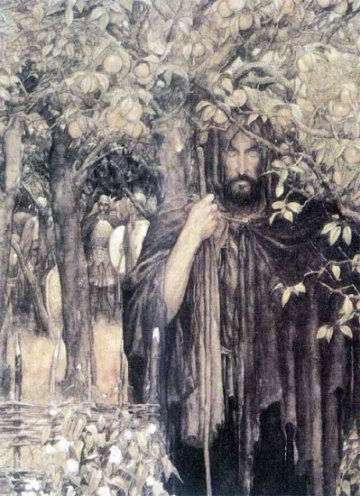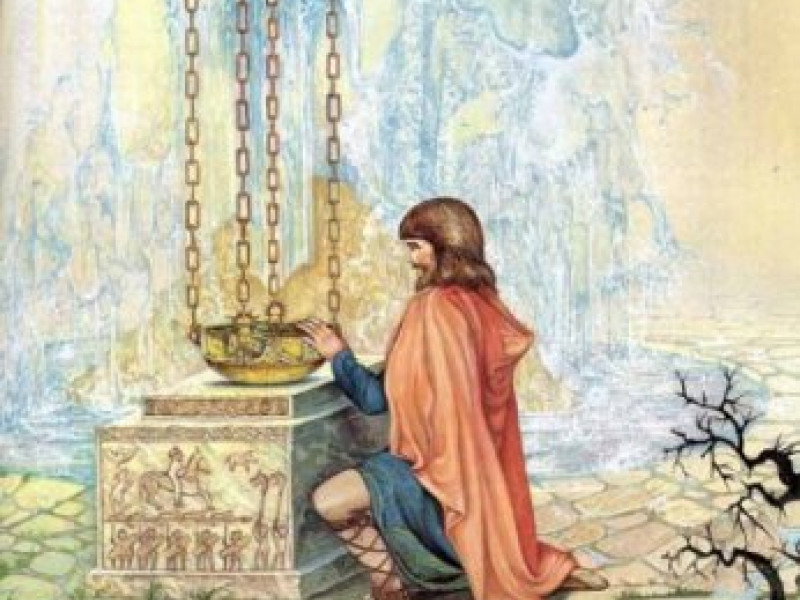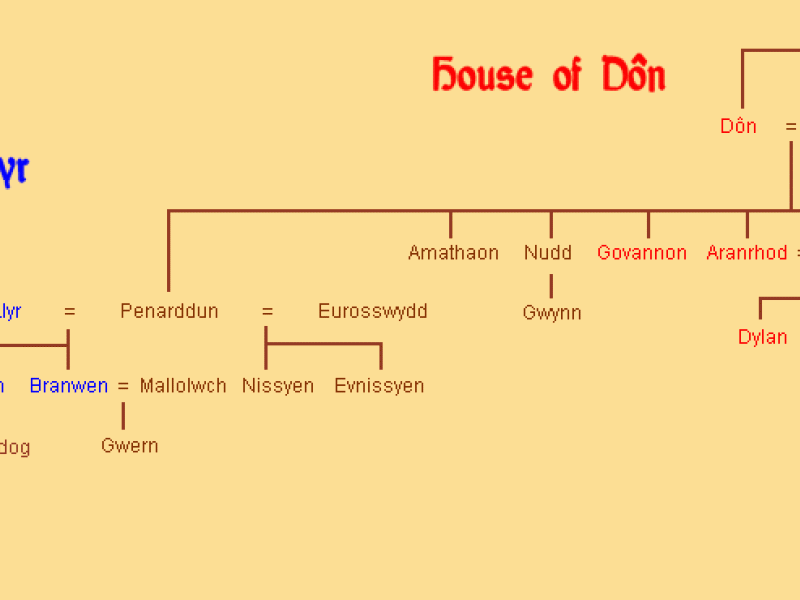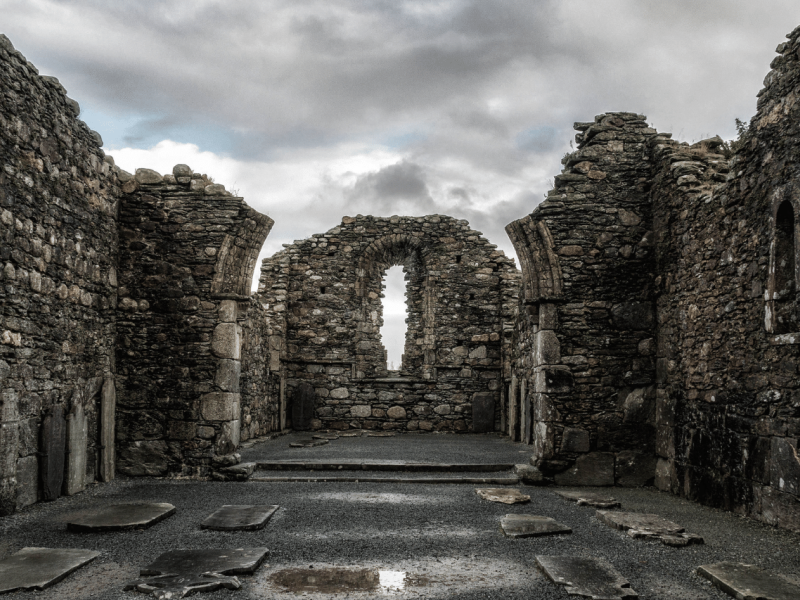Pwyll Lord of Dyved
Pwyll Lord of Dyved was the first of the Branches of the Mabinogion. The tale recounts his adventure in the Otherworld Annwvyn, how he wooed his wife Rhiannon and the unfair punishment of Rhiannon over the mysterious disappearance of their son.
Pwyll ruled Dyved in his court mainly at Arberth. He controlled seven districts known as "cantrevs", in southern Wales.
Lord of Annwvyn
Pwyll was a chieftain of Dyved, the land in the south-west of Wales. He went hunting at Glynn Cuch. When another set of hound outran his own and killed a stag, he chased the other hounds off and set his own hounds upon the dead stag. However, another lord saw this, told Pwyll that the game was rightfully his. Pwyll admitted wrongdoing, wished to make amend with the lord. The other lord agreed.
The lord told Pwyll that he was Arawn, king of Annwvyn (the Otherworld Annwn), and he wished to take Pwyll's place for one year while Pwyll posed as him. The idea was to let Pwyll rule his kingdom without anyone knowing he was an imposter, and defeat Havgtan in combat, who was also the king of Annwvyn.
At the end of the year, they would meet at the same spot. Pwyll agreed. With his magic, Arawn transformed Pwyll to look exactly like him and sent him to his realm, while Arawn took Pwyll's place in Dyved.
No one in Annwfn (Annwvyn) suspected that Pwyll was an impostor, even Arawn's lovely wife. Everyday he went hunting with his men, while at night he enjoyed the feast. When it was time for bed, each night, Pwyll would sleep with his back towards Arawn's wife. Though Arawn had implied (when they made the agreement) that Pwyll could sleep with his wife, Pwyll never had sex with her.
When the time came for the single combat between Pwyll and Havgan, the hero defeated and mortally wounded the other king. Pwyll refused to kill Havgan despite his pleas.
When the year ended, Pwyll arrived at his appointment where he first met Arawn. Arawn transformed them back to their normal forms. Pwyll returned to Dyved to find that he had prospered under Arawn's leadership.
Arawn returned to his own kingdom to find that Pwyll had ruled his kingdom with understanding, fairness and justice. What took Arawn by surprise was that every night, Pwyll had slept in bed with Arawn's beautiful wife, yet the hero had never once made love to her.
For such loyal friendship, Arawn rewarded the hero by making Pwyll's kingdom even richer. Pwyll was not just called Lord of Dyved; he was now known as Lord of Annwfn.
Wooing of Rhiannon
One day while Pwyll took a walk outside of his court at Arberth, he saw a beautiful maiden riding a pale horse. She rode along the highway at a seemingly slow but steady pace. None of his men knew who she was. Pwyll sent one of his men on foot to ask for her name. But the woman rode past Pwyll's servant. No matter how fast the servant ran, he could not catch up with her. This was surprising, since her horse had not increased its pace.
The next day, Pwyll saw the woman again and sent another servant, this time on horseback, to ask for her identity. Again, the woman's horse moved at a slow pace, yet as fast his servant rode his horse, the further he was left behind.
The next day, Pwyll was still determined to find out who she was, and asked one of his men to bring his fastest horse. Though she rode by at the same pace as she did yesterday, even his fastest horse could not catch up with her. His servant was not able to ask her any questions.
Pwyll was determined that he himself would go after her with his fastest horse, the following afternoon. However, he failed to catch up with her. The faster he set the pace, the further he was left behind.
In desperation, Pwyll called out to her to stop. The woman reined in and halted her horse because Pwyll had asked her to. She introduced herself as Rhiannon, the daughter of Heveydd the Old. She knew who Pwyll was. She came to Pwyll's land in the hope that he would marry her before one of her suitors, Gwawl, the son of Clud, could further press his claim upon her.
They were to be married within a year. Before the wedding could take place, a youth came before them, requesting a favour from Pwyll. Pwyll foolishly agreed without hearing it first. The youth desired to sleep with Pwyll's new bride. Pwyll realised that the youth was Gwawl. Since Pwyll had given his word, he could not take it back without breaking it.
Rhiannon advised Pwyll to ask Gwawl for a year respite. Her plan was to trick Gwawl into a game of Badger in a Bag. Rhiannon gave Pwyll a bottomless bag. Pwyll pretended to be a suppliant and beggar. Gwawl filled his sack with an endless amount of food. Pwyll then told them that bag would only be full if a nobleman pushed the food down with both feet. Rhiannon persuaded Gwawl to put both feet in the bag. Once Gwawl had both feet in the bag, Pwyll pulled the bag over Gwawl's head and tied it closed.
Pwyll's men began kicking Gwawl while he was in the bag, claiming there was a badger in the sack. Gwawl begged for mercy. Pwyll only released Gwawl when the youth promised not to sleep with Rhiannon, and that he would not take any reprisal against either Pwyll or Rhiannon.
Punishment of Rhiannon
Pwyll and Rhiannon were happily married for two years. However, in the third year, the men of Dyved were concerned that Rhiannon might be barren. His men wanted Pwyll to have an heir as soon as possible, and asked that he should divorce Rhiannon and find another wife who was more fertile. Pwyll persuaded his men to wait for another year.
Fortunately, Rhiannon fell pregnant almost at the end of the third year of marriage. When Rhiannon gave birth to their son, six women were to look after the infant.
That night, someone (her former suitor Gwawl) abducted the infant when the six women unexpectedly fell asleep, while Rhiannon was also asleep. When the six nurses discovered that infant had been abducted, they realised that they would be blamed for disappearance of Pwyll's son.
They treacherously smeared blood from a deer upon Rhiannon, and caused bruises on their own face. When Pwyll came to see his son, the six nurses accused Rhiannon of devouring her own son. They claimed they tried to protect the infant, but were helpless when the mad-driven mother attacked them.
Rhiannon told her husband that the six nurses were lying, but she was powerless to refute their claims. Pwyll, seeing the evidence on Rhiannon (the blood), believed the nurses' accusation.
Pwyll punished Rhiannon by making his wife sit outside the gate of his palace for seven years. Whenever someone arrived at the gate, Rhiannon had to tell the person, who did not know about the tragedy, that she had murdered her own son. She had to carry any guest or stranger on her back.
A few nights later after the abduction, Teirnon Twrvliant, the lord of Gwent Ys Coed, was attending the birthing of a colt. Suddenly a claw from an unknown creature (Gwawl, again) broke through the window, trying to steal the colt. Teirnon drew his sword and cut off the creature's arm. Teirnon was telling his wife what was happening when they heard a cry at their front door.
Teirnon went to investigate and discovered an infant. He realised that the creature must have left it behind. Teirnon and his wife had been trying to have a child for years, so they decided to adopt and raise the infant as their own. They named the boy Gwri Gwallt-Euryn ("Golden Hair").
Almost a year later, Teirnon and his wife heard news of Rhiannon's punishment for killing her son. Teirnon realised that the creature must have abducted their son and left Gwri at their doorstep. His wife heartbreakingly agreed with him that the child belonged to Pwyll, and that Rhiannon was unjustly being punished for a crime she did not commit.
Teirnon went to Pwyll's home, ended Rhiannon's punishment and returned their son to them. Pwyll named the boy Pryderi (which means "relief from her anxiety"). Pwyll was then reunited with his wife.
Pwyll rewarded Teirnon by allowing Teirnon's wife to continue rearing Pryderi as a foster parent. Pwyll also gave them land.
Pwyll ruled the land until his death. Pryderi inherited all the land from his father. Pryderi married Kigva, daughter of Gwynn the Splendid, the son of Gloyw Wide Hair son of the ruler of Casnar.
Pryderi conquered seven other cantrevs - three cantrevs from Ystrad Tywi (east of Dyved), four from Keredigyawn (northeast of Dyved).
Related Information
Sources
Pwyll Lord of Dyved from the Mabinogion.
Related Articles
Rhiannon, Pryderi, Arawn.
Genealogy: House of Don and House of Llyr.
By Jimmy Joe






